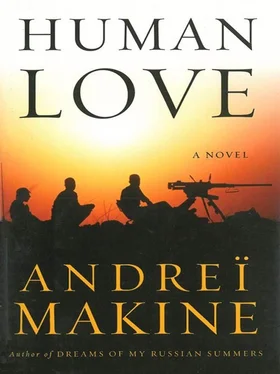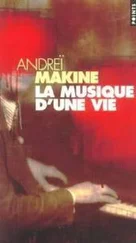We collapse at the stern of the boat in a seething mass of bodies, bundles, chests, ropes. The deck is covered in fine coal dust, which mingles with the white powder escaping from the sacks of flour being transported by half a dozen men as they brutally thrust aside the refugees and their wretched luggage. This loading reassures us a little: it is doubtless humanitarian aid that has been diverted and is due to be unloaded in some foreign port, along with ourselves.
At the end of the night the cargo boat attempts to berth. The outline of a jetty can be seen emerging from the darkness, a few lights… And then there are these interminable seconds when we are still moving forward, even though the boats engines have already gone into reverse at full power. From the jetty a heavy machine gun is raking it with, one might say, the infantile glee of having found a target exposed, as if in a shooting gallery The cries of those afraid of being killed are, as always, more shrill than the moans of those who have just been hit. A wild-looking man approaches the deckhouse, seeking refuge, sits down, spits blood. A woman beside me, all hunched up, scrapes patiently at the flaking paintwork on the coal-blackened deck. She will carry on with her demented activity throughout the day, as if to give just measure to the madness that surrounds us.
In the morning, traveling within a few miles of the shore, we pass alongside fabulous gardens whose abundance cuts into the dry and ocherous line of the coast. Houses hidden in their greenery, hinting at shade and coolness. A town to the south of Mogadishu, Merca, no doubt – a paradise before the hell of a day baked by the sun and thirst.
An important day for both of us. We have to rid ourselves of our fear, the sentimentality of memories, of all notion of superiority in the face of this suffering human mass, this woman scratching at the flaking paintwork. We are all fraternally united by the spark of life that still glows in us all. And when, after another attempt at landing and more shooting, the people around us lie down on the deck, we do the same, pressed up against these emaciated bodies, protecting the body of Elias stretched out between us.
At the approach of night (our second night at sea), the boat sails farther from the coast, then suddenly stops. Incredulous, we hear the engine wheezing as it slows down, then finally, and even more unbelievably, silence. Or rather the inhalations and exhalations of the heap of human beings on the deck, their groaning, murmuring, rustling. The night is perfectly calm, without any breeze, and these quiet voices filter out from the darkness with striking intimacy. My own breathing, made jerky by the fever, seems to me deafening. Leonid sits up, removes his headphones, and in their susurration I recognize one of the tunes I know, which he listens to over and over again to struggle against his tears.
We do not know if the ship will move on and what its destination will be. This uncertainty no longer concerns us. We speak briefly about Elias and decide what we must now do. Leonid clears a way for himself, stepping over recumbent bodies, and disappears into the bowels of the ship. He returns quickly, laden with a heavy cast iron cogwheel and an old, worn length of rope…
Elias s face, as we look at it for the last time, appears relaxed, like that of one asleep. I am afraid lest this body, in its blanket bound with ropes, might look like a parcel. But its outline is more reminiscent of a carved block of stone. To the foot of this block Leonid fastens the cogwheel.
The level of the cargo boats afterdeck is a few feet above the water. We lay out the body along the steel gunwale, then rise upright above him, only able to honor him by standing clumsily to attention thus, among passengers who lie, sit, and stand. The silence of a moment ago has given way to an increasingly violent hubbub. People are remonstrating with the crew members, hammering on the wheel-house door. While the boat was under way it mattered little to them where it was bound for, since we were traveling away from death. Now death assumes the face of this calm, moonless night, without a breath of air – immobility, thirst, this boat stock-still amid the murky darkness of sky and ocean. I see a man with a long knife in his hand slicing through the crowd to reach a sailor, who points an automatic pistol at him; it is strangely small, almost a toy Two other men grapple with one another, yelling, thrusting one another against a metal companionway The weeping of the children blends together for a moment into a shrill chorus; then only the woman scraping at the deck seems totally separate from the madness of the people whose shouting is an attempt to keep death at bay I see that, in fact, she is obstinately cleaning the dirty surface: a very smooth little square is already gleaming beneath her fingers.
Without conferring, Leonid and I pause for a breathing space, a moment of silence – he, his face streaming with tears that he no longer even notices, myself, attempting to contain the fever that freezes me. The woman cleaning the deck is slowly drawing closer to the place where we threw down our gear.
THE QUESTION MUST HAVE BEEN ASKED ONCE ALREADY, for the chairman seems to be repeating it with the slow insistence one adopts when faced with a foreigner who is not quick on the uptake. I really only gather my wits at the moment when this voice with carefully enunciated syllables is uttering the final words. An embarrassed silence. I rouse myself from my memories, encounter the looks, amused or uneasy, of the other participants in the roundtable discussion, the chairman’s frozen smile… The Togolese writer, inexhaustible this evening, saves the situation: I’d like to take advantage of my Russian colleague’s confusion to tell you that, during his travels in the East, Flaubert saw nothing shocking in a woman profiting from her body with total freedom. In African women this utilitarian attitude is very widespread…” The debate resumes; the chairman is visibly relieved. This fragment sticks in my mind: “with total freedom.” The freedom of the African woman selling her body…
Just now, when I felt I was still present In that room, a hardened, trenchant Indignation tore at nerves within me that I had thought long since blanketed in indifference. I loathed that gang of International bureaucrats, sitting there In the front row after a week of palavers and meals In a luxury hotel. I remarked to myself what I had had occasion to observe twenty years earlier: How many children could be saved for the price of just one of those suits each of these monstrous Africans was wearing? I loathed the intellectual geisha girls, performing their “afrodisiac Africa” routine for these blasé spectators, instead of being up in arms. They were carving up the continent just like that photo I had seen in a book as a child long ago: a dismembered elephant. Its head, the trunk, the body the legs… everyone got their share that evening. The bureaucrats, the intellectuals, the audience who, for want of anything better, were laughing at these grandstanding writers’ banter. And even that organizer with her locks dyed the color of beets; she had contrived to carve herself a portion of flesh, the body of the young Congolese…
At a certain moment the sight of their faces became too painful for me. I hastened to plunge back into that terrible night in Somalia, compounded of massacre, screaming, and thirst, but where nevertheless I managed to breathe. I knew that the past could only end in death for some, flight for others, and for the two of us a long, chaotic return (a week convalescing in Addis Ababa), a return to a homeland, to that USSR which, by the end of the same year, would no longer exist. And yet on this boat adrift on an ocean at night, the sovereign truth of life broke through: the certainty that the passing of a man who loved does not signify the death of the love he carried within him.
Читать дальше









